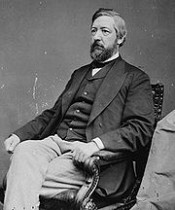Blaine James Gillespie

James Gillespie Blaine (January 31, 1830 – January 27, 1893) was a U.S. Representative, Speaker of the United States House of Representatives, U.S. Senator from Maine, two-time United States Secretary of State, and champion of the Half-Breeds. He was a dominant Republican leader of the post-Civil War period, obtaining the 1884 Republican nomination, but losing to Democrat Grover Cleveland. Blaine was born in West Brownsville, Washington County, Pennsylvania, near Pittsburgh. His parents were Ephraim Lyon Blaine and his wife Maria Gillespie. The Blaines were Scots-Irish Americans.[1][2] According to Blaine's entry in the "Representative Men of Maine" (1893), "Ephraim L. was an intellectual, an educated, and, in many respects, a brilliant man, but he was not regarded as a practical man. He was a graduate of Washington College. In 1820 he married Maria Gillespie, a granddaughter of Neal Gillespie, who came to America from the north of Ireland in 1771. The husband was a Presbyterian and the wife a Roman Catholic of the milder form." [3] Ephraim reportedly "laid out the original plan of the town of West Brownsville" in 1831.[2] His paternal grandfather was named James Blaine, the first of the family to settle in Brownsville. He was elected Justice of the Peace for several years.[2] His paternal great-grandfather Col. Ephraim Blaine (1741-1804), served in the Continental Army during the American War of Independence, from 1778 to 1782 as commissary-general of the Northern Department.[3] His wife was Rebekah Galbraith.[2] With many early evidences of literary capacity and political aptitude, Blaine graduated at Washington College (now Washington and Jefferson College) in nearby Washington, Pennsylvania, in 1847, where Blaine was a member of the Delta Kappa Epsilon fraternity (Theta chapter). Subsequently, Blaine taught at the Western Military Institute in Blue Lick Springs, Kentucky, and from 1852 to 1854, he taught at the Pennsylvania Institution for the Blind in Philadelphia. During this period, also, he studied law. Blaine married Harriet Stanwood on June 30, 1850. After settling in Augusta, Maine, in 1854, he became editor of the Kennebec Journal, and subsequently on the Portland Advertiser. He soon abandoned editorial work for a more active public career. He served as a member in the Maine House of Representatives from 1859 to 1862, serving the last two years as speaker. He also became chairman of the Republican state committee in 1859, and for more than 20 years personally directed every campaign of his party. Among Blaine's admirers, he was known as the "Plumed Knight." Blaine was elected as a Republican to the 38th United States Congress and to the six succeeding U.S. Congresses and served from March 4, 1863, to July 10, 1876, when he resigned. He was Speaker of the House for three terms—during the 41st through 43rd United States Congresses. He served as chairman of the Rules Committee during the 43rd through 45th United States Congresses, followed by over four years in the Senate. The measures for the rehabilitation of the states that had seceded from the Union occupied the chief attention of Congress for several years, and Blaine bore a leading part in framing and discussing them. The primary question related to the basis of representation upon which they should be restored to their full rank in the political system. A powerful section contended that the basis should be the body of legal voters, on the ground that the South should not be given more seats as long it disenfranchised freedmen. Blaine, on the other hand, contended that representation should be based on population instead of voters, as being fairer to the North, where the ratio of voters varied widely, and he insisted that it should be safeguarded by security for impartial suffrage. This view prevailed, and the Fourteenth Amendment to the United States Constitution was substantially Blaine's proposition. Blaine opposed the scheme of military governments for the Southern states supported by the Radical Republicans, insisting there be a clear path by which they could release themselves from military rule and resume civil government. He was the first in Congress to oppose the claim, which gained momentary and widespread favor in 1867, that the public debt, pledged in coin, should be paid in greenbacks. He took up the cause of naturalized American citizens who, on return to their native land, were subject to prosecution on charges of disloyalty. His work led to the treaty of 1870 between the United States and Britain, which placed adopted and native citizens on the same footing. In 1875, allegedly to promote the separation of church and state, Blaine proposed a constitutional amendment that would prohibit the use of public funds by any religious school. The amendment did not pass at the federal level, falling four votes short of the required two-thirds majority in the Senate, but a majority of states subsequently adopted similar laws, which are commonly known as Blaine Amendments. The amendment did not forbid generic religious instruction at public schools, so long as it was not under the control of a particular sect. (Indeed, public schools continued to teach Biblical studies and religious instruction for some years even in states which adopted Blaine Amendments.) Catholics denounced the Blaine Amendment as anti-Catholic. It was strongly supported by religious non-Catholics: Protestants, especially Methodists, Baptists and Congregationalists. Blaine was an unsuccessful candidate for nomination for President on the Republican ticket in 1876. (See United States presidential election, 1876, United States presidential election, 1880.) His chance for securing the 1876 nomination, however, was damaged by persistent charges that as a member of Congress he had been guilty of corruption in his relations with the Little Rock & Fort Smith Railway and the Northern Pacific Railway. By the majority of Republicans, he was considered to have cleared himself completely, and he missed the nomination for President by only 28 votes at the Republican National Convention, being finally beaten by a combination of supporters of all the other candidates going to dark horse nominee Rutherford B. Hayes. He was mocked by political opponents as "Blaine, Blaine, James G. Blaine, the continental liar from the State of Maine!" Blaine was appointed and subsequently elected as a Republican to the Senate. He served for four years, and his political activity was unabated — currency laws were especially prominent in his legislative portfolio. Blaine, who had previously opposed greenback inflation, now resisted depreciated silver coinage. He championed the advancement of American shipping, and advocated generous subsidies, insisting that the policy of protection should be applied on sea as well as on land. Blaine was re-elected and served from July 10, 1876, to March 5, 1881, when he resigned to become Secretary of State. While in the Senate, he held the minor chairmanships of the U.S. Senate Committee on Civil Service and Retrenchment (45th Congress) and U.S. Senate Committee on Rules (also 45th Congress). During this period he tried again for a Presidential nomination: the Republican National Convention of 1880, divided between the two nearly equal forces of Blaine and former President Ulysses Grant — John Sherman of Ohio also having a considerable following — struggled through 36 ballots, when the friends of Blaine, combining with those of Sherman, succeeded in nominating James A. Garfield. Blaine was Secretary of State in the cabinets of James A. Garfield and Chester A. Arthur; later, when he took the same job in President Benjamin Harrison's Cabinet, he became the second and last person to hold this position in two non-consecutive terms. After Garfield's death on September 19, 1881, Arthur asked all of the cabinet members to postpone their resignations until Congress recessed that December. Blaine initially agreed but changed his mind in mid-October and left office December 19.[4] During his two months under Arthur, Blaine dedicated his time to forging his own achievements in an attempt to improve his chances in the 1884 presidential election. In June 1884, he was nominated to run for president by his party on the fourth ballot at the 1884 Republican National Convention.[5] He was the unsuccessful Republican nominee for President in 1884; he was the only nonincumbent Republican nominee to lose a presidential race between 1860 and 1912, and only the second Republican Presidential nominee to lose at all. Republican reformers, called "Mugwumps," supported Cleveland because of Blaine's reputation for corruption. After heated canvassing, he lost by a narrow margin in New York. Many, including Blaine himself, attributed his defeat to the effect of a phrase, "Rum, Romanism and Rebellion", used by a Protestant clergyman, the Rev. Samuel D. Burchard, on October 29, 1884, in Blaine's presence, to characterize what, in his opinion, the Democrats stood for. "Rum" meant the liquor interest; "Romanism" meant Catholics; "Rebellion" meant Confederates in 1861. The phrase was not Blaine's, but his opponents made use of it to characterize his hostility toward Catholics, some of whom probably did switch their vote. Blaine's mother was a Roman Catholic of Irish descent and his sister was a nun, and speculation was that he might gain votes from a heavily Democratic group. However, Catholics were already suspicious of Blaine over his support of the Blaine Amendments. Refusing to be a presidential candidate again in 1888, he became Secretary of State in President Benjamin Harrison's Cabinet from 1889 to 1892. His service in the State Department was distinguished by several notable steps. In order to promote the friendly understanding and cooperation of the nations on the American continents, he projected a Pan-American Congress which, after being arranged for and led by Blaine as its first president, was frustrated by his retirement. (Its most important conclusions were the need for reciprocity in trade, a continental railway and compulsory arbitration in international complications.) Shaping the tariff legislation for this policy, Blaine negotiated a large number of reciprocity treaties which augmented the commerce of his country.
do you like this author?
What readers are saying
What do you think? Write your own comment on this book!
write a commentWhat readers are saying
What do you think? Write your own comment on this author!
write a commentBook list

Twenty Years of Congress,Vol. 1
From Lincoln to Garfield,with a Review of the Events Which
Led to the Political Revolution of 1860
Series:
Unknown
Year:
Unknown
Raiting:
3.5/5
Show more
add to favoritesadd In favorites

Twenty Years of Congress,Volume 2
From Lincoln to Garfield,with a Review of the Events Which Led to the Political Revolution of 1860
Series:
Unknown
Year:
Unknown
Raiting:
2.5/5
Show more
add to favoritesadd In favorites

twenty years of congress from lincoln to garfield with a review of the events
Series:
Unknown
Year:
Unknown
Raiting:
3.5/5
This volume is produced from digital images created through the University of Michigan University Library's preservation reformatting program. The Library seeks to preserve the intellectual content of items in a manner that facilitates and promotes a variety of uses. The digital reformatting process results in an electronic version of the text that can both be accessed online and used to create new print copies. This book and thousands of others can be found in the digital collections of the University of Michigan Library. The University Library also understands and values the utility of print, and makes reprints available through its Scholarly Publishing Office.
Show more
add to favoritesadd In favorites
Book list

Twenty Years of Congress,Vol. 1
From Lincoln to Garfield,with a Review of the Events Which
Led to the Political Revolution of 1860
Series:
Unknown
Year:
Unknown
Raiting:
3.5/5
Show more
add to favoritesadd In favorites

Twenty Years of Congress,Volume 2
From Lincoln to Garfield,with a Review of the Events Which Led to the Political Revolution of 1860
Series:
Unknown
Year:
Unknown
Raiting:
2.5/5
Show more
add to favoritesadd In favorites

twenty years of congress from lincoln to garfield with a review of the events
Series:
Unknown
Year:
Unknown
Raiting:
3.5/5
This volume is produced from digital images created through the University of Michigan University Library's preservation reformatting program. The Library seeks to preserve the intellectual content of items in a manner that facilitates and promotes a variety of uses. The digital reformatting process results in an electronic version of the text that can both be accessed online and used to create new print copies. This book and thousands of others can be found in the digital collections of the University of Michigan Library. The University Library also understands and values the utility of print, and makes reprints available through its Scholarly Publishing Office.
Show more
add to favoritesadd In favorites

twenty years of congress from lincoln to garfield volume 2
Series:
Unknown
Year:
Unknown
Raiting:
4.5/5
Show more
add to favoritesadd In favorites

republican economy vs democratic extravagance volume 1
Series:
Unknown
Year:
Unknown
Raiting:
2.5/5
Show more
add to favoritesadd In favorites

republican economy and democratic extravagance speech of hon james g blaine
Series:
Unknown
Year:
Unknown
Raiting:
3.5/5
Show more
add to favoritesadd In favorites

political discussions legislatuve diplomatic and popular 1856 1886
Series:
Unknown
Year:
Unknown
Raiting:
4.5/5
Show more
add to favoritesadd In favorites

political discussions legislative diplomatic and popular 1856 1886
Series:
Unknown
Year:
Unknown
Raiting:
2.5/5
Show more
add to favoritesadd In favorites

ought the negro to be disfranchised ought he to have been enfranchised
Series:
Unknown
Year:
Unknown
Raiting:
4/5
Show more
add to favoritesadd In favorites

memorial address on the life and character of james abraham garfield delivered
Series:
Unknown
Year:
Unknown
Raiting:
3.5/5
Show more
add to favoritesadd In favorites

james a garfield
Series:
Unknown
Year:
Unknown
Raiting:
3/5
1882. MEMORIAL ADDRESS. -- Mr. PRESIDENT For the second time in this generation the great departments of the Governnent of the United States are assernbled in the Hall of Representatives to do honor to the memory of a murdered President. Lincoln fell
Show more
add to favoritesadd In favorites

international american conference opening and closing addresses by james g bla
Series:
Unknown
Year:
Unknown
Raiting:
4.5/5
Show more
add to favoritesadd In favorites

eulogy on james a garfield twentieth president of the united states
Series:
Unknown
Year:
Unknown
Raiting:
3.5/5
Show more
add to favoritesadd In favorites

blaines reply to gladstone free trade and protection from remarks on banking
Series:
Unknown
Year:
Unknown
Raiting:
4.5/5
Show more
add to favoritesadd In favorites
What readers are saying
What do you think? Write your own comment on this author!
write a commentif you like Blaine James Gillespie try:
readers also enjoyed
What readers are saying
What do you think? Write your own comment on this author!
write a commentGenre
if you like Blaine James Gillespie try:
readers also enjoyed
Do you want to exchange books? It’s EASY!
Get registered and find other users who want to give their favourite books to good hands!

